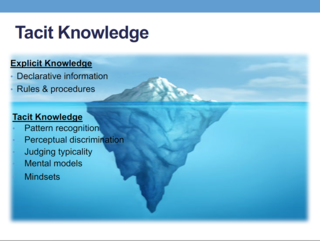What can we do to get up to speed more quickly? In previous blogs, I examined ways to identify who is an expert, as well as cognitive coaching — mindset shifts that trainers need to make to do a better job of building expertise in the trainees.
This post is about what any individual can do, without any coaches. It’s a topic I’ve been pondering for decades. I even wrote a book about it, The Power of Intuition (2005), but that was more than a decade ago. Based on my experiences in the past four years with ShadowBox training [Klein & Borders, 2016], I think I have learned some things. Some of the tips in this post just repeat ideas from the 2005 book, but others are new. Some of the tips come from a book by Hoffman et al. (2014) Accelerated Expertise—a very valuable overview of research in this area. Other tips can be found in an article by Fadde and Klein (2012).
In my view, expertise depends on tacit knowledge rather than explicit knowledge of facts, rules, and procedures. By tacit knowledge, I mean the perceptual skills required to make fine discriminations, to detect patterns, to judge familiarity (and therefore to notice anomalies), to draw on a rich mental model of causal relations. These are the items under the waterline in the diagram.

So how can we strengthen our tacit knowledge? Here are nine ideas we can put into practice.
One: Seek feedback. I am continually surprised by professionals who think all they need to do is show up at work and magically they will get better. They don’t give a thought to getting feedback, or else they find excuses — it’s too hard, too labor intensive, too many privacy restrictions, and on and on. Yes, it is often hard to get feedback, but many people just don’t even try. And when they do, they settle for feedback on explicit knowledge (facts, rules, procedures) rather than tacit knowledge. In my book Streetlights and Shadows (Klein, 2009) I discuss all the reasons that feedback is not trivial to obtain or to interpret, and my advice is that we shouldn’t be satisfied with outcome feedback. Instead, we can seek process feedback. If I want to improve at archery, I need feedback about where each arrow lands (outcome feedback) but I also need feedback about my form (process feedback). If I am engaged in underwriting large investments, I won’t get feedback on how the endeavor played out for years, perhaps decades. But I can get feedback on the way I made my estimates and the types of variables I included or ignored. Without feedback, especially process feedback, we cannot make much progress.
Two: Consult with Experts. Meaningful feedback comes from experts who will take the time to help us. Who is an expert? See my earlier post on identifying experts. We can get their thoughts on the actions we’ve chosen. We can also get their views on the processes we went through. I know that experts can be intimidating, and we don’t want to pester them too often. We also run a risk in even asking for feedback because we are making ourselves vulnerable. On the other hand, many experts appreciate being singled out for assistance and may take a stronger interest in helping us advance.
But we shouldn’t waste the experts’ time with useless questions like, “How am I doing?” We’re likely to get useless answers, like “Just fine. Keep it up.” Instead, we should be specific. We should ask about a particular incident, a tough situation. See how the experts made sense of it. What goals would they have prioritized? What questions do they ask that we haven’t even considered? What were they noticing that we had ignored? What do they think of the strategy we pursued? Here we are getting into valuable on-the-job training centered on actual cases. We are engaging in a fruitful dialog. We are not simply asking for advice but probing the thinking of the experts and pressing back if we don’t agree with them in order to make them think more deeply themselves.
Three: Vicarious experiences. It is easier and safer to learn from other people’s experiences and mistakes than our own, and as long as we are having dialogs with experts, we can ask them about their tough cases — what made these cases so tough? With hindsight what would the experts have done differently? What do they wish they had been paying more attention to right from the start?
Four: Curiosity. Obviously, curiosity is a powerful motivator for learning and for gaining expertise. Unfortunately, I have not come across any great ideas for stimulating curiosity. But I have come across some ways that curiosity gets squashed (mostly from Ed Noble at Nova Chemicals), so we can be alert to these to see if they are taking a toll. They include worrying so much about making mistakes that we are afraid to explore things. Or having a compulsive attitude of wanting to study all the material rather than taking side explorations into topics that seem interesting or strange. Or being afraid to ask questions in a class for fear of looking stupid.
Another tip about curiosity is that it can help us overcome fixation. Sometimes we form an incorrect hypothesis about what is causing a problem and then we fixate on that hypothesis and explain away evidence to the contrary. If we can become curious about these anomalies, the contrary evidence, we might more quickly notice that our initial hypothesis is wrong. Similarly, if our mental model of how things work is flawed, we may hold onto that flawed belief and explain away inconsistencies, whereas curiosity might direct our attention to the inconsistencies and make us wonder what is really going on. (See Klein & Baxter, 2009, for a fuller discussion of this point.)
Five: A growth mindset. Carol Dweck (2006) has distinguished a fixed mindset (I am either good at a skill or not) from a growth mindset (with practice I can get better and possibly even get very good). Clearly, a growth mindset can help motivate us to gain expertise. There are mixed reports about whether Dweck’s findings can be replicated, but it still makes sense to me and it can’t hurt.
Six: Overcoming a procedural mindset. So many of us are captured by the belief that even complex tasks can be broken down into procedures and if we just master the procedures, we will become experts. As I have stated in the past, procedures are often necessary but are rarely sufficient. Procedures don’t reflect tacit knowledge that is the core of expertise. So to gain expertise, we need to shift from a procedural mindset to one that is sensitive to tacit knowledge and curious about it. We also have to shift from a procedural mindset to a problem-solving mindset, and that means being alert to what is happening in a situation and what is needed rather than adopting a checklist stance of following the official routine for getting the job done.
Seven: Harvesting mistakes. Countless self-help manuals advise us to make use of mistakes in order to grow, encouraging us to welcome mistakes as opportunities. True enough, but that advice just isn’t realistic. I hate making mistakes. I don’t feel grateful when I make them. They eat at me until I can figure out why I made them and what I should have done.
That’s how mistakes motivate me — not by welcoming them but by mulling them over and feeling annoyed with myself, usually for several days, until I am able to make sense of them and discover what I should have been noticing or inferring or doing. After all, if I can’t be smart in hindsight, I can never be smart.
Failures alone are just punishment — we need to diagnose the reasons for the failures.
Eight: Adapt and discover. When people tell me about trips they have come back from, they don’t describe all the flights and hotel reservations that worked out smoothly. Instead, they tell me about the glitches — missed connections because of weather delays, hotels that somehow lost the reservation information — and how they solved their problems. They are usually very proud of themselves for their ability to adapt. That doesn’t mean we don’t need to prepare carefully — it does mean that we don’t have to come unglued when the preparations don’t work out as we expected. In my experience, experts in a field sometimes seem to relish challenges that fall outside the normal procedures.
Perhaps we can develop a mindset that appreciates these opportunities to stretch, to surprise ourselves with our resourcefulness. We might even think of modeling this mindset with our children in the hope of making them more resilient. Once I was taking one of my grandsons, Koby, by bus to a restaurant, and Koby became alarmed that we were getting lost. Instead of trying to convince Koby not to worry, I turned it into a game: If we were getting lost, how could we figure out where we needed to be heading? How could we re-orient? Were there other ways to get to the restaurant besides using a bus? I think Koby was a little disappointed when the bus actually took us to the restaurant.
Nine: Don’t let evaluation interfere with training. When an instructor is judging our performance, we naturally tighten up and try to avoid making mistakes. Even without an instructor, when we are evaluating ourselves it is hard to grant ourselves the freedom to explore a task or a situation. It can be hard to take advantage of our curiosity. The tip here is to notice when we are getting into a self-evaluation mindset and try to dial back on that, even a little, so that we can learn more.
That’s it, for now. Nine tips on ways we can pursue mastery and expertise. Nine tactics for acquiring tacit knowledge.
References
Dweck, C. (2006). Mindsets: The new psychology of success. New York: Random House.
Fadde, P. J., & Klein, G. (2012). Accelerating expertise using action learning activities. Cognitive Technology, 17(1), 11-18.
Hoffman, R.R., Ward, P., Feltovich, P.J., DiBello, L., Fiore, S.M., and Andrews, D. (2014). Accelerated expertise: Training for high proficiency in a complex world. New York: Psychology Press.
Klein, G. (2005). The power of intuition. New York, NY: A Currency Book/Doubleday.
Klein, G. (2009). Streetlights and shadows: Searching for the keys to adaptive decision making. Cambridge, MA: MIT Press.
Klein, G., & Baxter, H. C. (2009). Cognitive transformation theory: Contrasting cognitive and behavioral learning. In D. Schmorrow, J. Cohn, & D. Nicholson (Eds.), The PSI handbook of virtual environments for training and education: Developments for the military and beyond. Volume I: Learning, requirements and metrics (pp. 50-64). Westport, CT: Praeger Security International.
Klein, G., & Borders, J. (2016). The ShadowBox approach to cognitive skills training. Journal of Cognitive Engineering and Decision Making, 10, 268-280.




